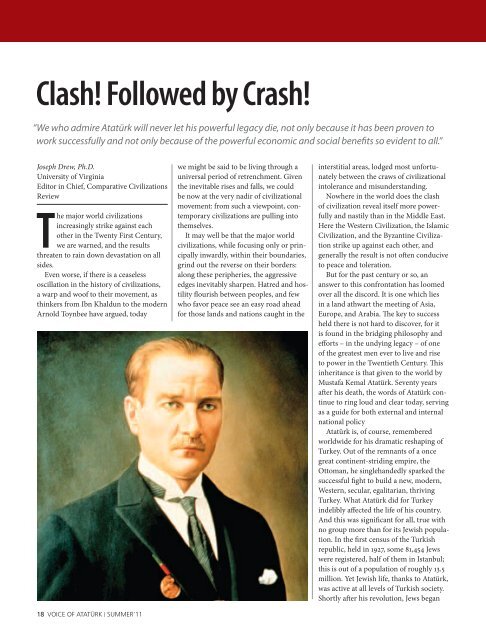Good Will Gestures in Thessaloniki - Ataturk Society of America
Good Will Gestures in Thessaloniki - Ataturk Society of America
Good Will Gestures in Thessaloniki - Ataturk Society of America
You also want an ePaper? Increase the reach of your titles
YUMPU automatically turns print PDFs into web optimized ePapers that Google loves.
Clash! Followed by Crash!<br />
“We who admire Atatürk will never let his powerful legacy die, not only because it has been proven to<br />
work successfully and not only because <strong>of</strong> the powerful economic and social benefits so evident to all.”<br />
Joseph Drew, Ph.D.<br />
University <strong>of</strong> Virg<strong>in</strong>ia<br />
Editor <strong>in</strong> Chief, Comparative Civilizations<br />
Review<br />
the major world civilizations<br />
<strong>in</strong>creas<strong>in</strong>gly strike aga<strong>in</strong>st each<br />
other <strong>in</strong> the Twenty First Century,<br />
we are warned, and the results<br />
threaten to ra<strong>in</strong> down devastation on all<br />
sides.<br />
Even worse, if there is a ceaseless<br />
oscillation <strong>in</strong> the history <strong>of</strong> civilizations,<br />
a warp and wo<strong>of</strong> to their movement, as<br />
th<strong>in</strong>kers from Ibn Khaldun to the modern<br />
Arnold Toynbee have argued, today<br />
18 VOICE OF AtAtüRk | SUMMER’11<br />
we might be said to be liv<strong>in</strong>g through a<br />
universal period <strong>of</strong> retrenchment. Given<br />
the <strong>in</strong>evitable rises and falls, we could<br />
be now at the very nadir <strong>of</strong> civilizational<br />
movement: from such a viewpo<strong>in</strong>t, contemporary<br />
civilizations are pull<strong>in</strong>g <strong>in</strong>to<br />
themselves.<br />
It may well be that the major world<br />
civilizations, while focus<strong>in</strong>g only or pr<strong>in</strong>cipally<br />
<strong>in</strong>wardly, with<strong>in</strong> their boundaries,<br />
gr<strong>in</strong>d out the reverse on their borders:<br />
along these peripheries, the aggressive<br />
edges <strong>in</strong>evitably sharpen. Hatred and hostility<br />
flourish between peoples, and few<br />
who favor peace see an easy road ahead<br />
for those lands and nations caught <strong>in</strong> the<br />
<strong>in</strong>terstitial areas, lodged most unfortunately<br />
between the craws <strong>of</strong> civilizational<br />
<strong>in</strong>tolerance and misunderstand<strong>in</strong>g.<br />
Nowhere <strong>in</strong> the world does the clash<br />
<strong>of</strong> civilization reveal itself more powerfully<br />
and nastily than <strong>in</strong> the Middle East.<br />
Here the Western Civilization, the Islamic<br />
Civilization, and the Byzant<strong>in</strong>e Civilization<br />
strike up aga<strong>in</strong>st each other, and<br />
generally the result is not <strong>of</strong>ten conducive<br />
to peace and toleration.<br />
But for the past century or so, an<br />
answer to this confrontation has loomed<br />
over all the discord. It is one which lies<br />
<strong>in</strong> a land athwart the meet<strong>in</strong>g <strong>of</strong> Asia,<br />
Europe, and Arabia. The key to success<br />
held there is not hard to discover, for it<br />
is found <strong>in</strong> the bridg<strong>in</strong>g philosophy and<br />
efforts – <strong>in</strong> the undy<strong>in</strong>g legacy – <strong>of</strong> one<br />
<strong>of</strong> the greatest men ever to live and rise<br />
to power <strong>in</strong> the Twentieth Century. This<br />
<strong>in</strong>heritance is that given to the world by<br />
Mustafa Kemal Atatürk. Seventy years<br />
after his death, the words <strong>of</strong> Atatürk cont<strong>in</strong>ue<br />
to r<strong>in</strong>g loud and clear today, serv<strong>in</strong>g<br />
as a guide for both external and <strong>in</strong>ternal<br />
national policy<br />
Atatürk is, <strong>of</strong> course, remembered<br />
worldwide for his dramatic reshap<strong>in</strong>g <strong>of</strong><br />
Turkey. Out <strong>of</strong> the remnants <strong>of</strong> a once<br />
great cont<strong>in</strong>ent-strid<strong>in</strong>g empire, the<br />
Ottoman, he s<strong>in</strong>glehandedly sparked the<br />
successful fight to build a new, modern,<br />
Western, secular, egalitarian, thriv<strong>in</strong>g<br />
Turkey. What Atatürk did for Turkey<br />
<strong>in</strong>delibly affected the life <strong>of</strong> his country.<br />
And this was significant for all, true with<br />
no group more than for its Jewish population.<br />
In the first census <strong>of</strong> the Turkish<br />
republic, held <strong>in</strong> 1927, some 81,454 Jews<br />
were registered, half <strong>of</strong> them <strong>in</strong> Istanbul;<br />
this is out <strong>of</strong> a population <strong>of</strong> roughly 13.5<br />
million. Yet Jewish life, thanks to Atatürk,<br />
was active at all levels <strong>of</strong> Turkish society.<br />
Shortly after his revolution, Jews began


